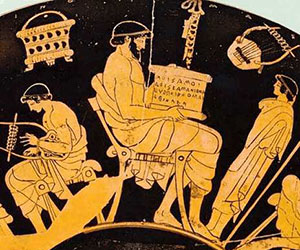
Greek schools: The students stand before the teachers.
Did ancient Greek kids go to school?
Most Greek children never went to school at all. Girls, to begin with, always stayed with their mothers until they were married, either at home or working in the fields.
Women in ancient Greece
All our ancient Greece articles
What if they were enslaved?
Enslaved children, whether boys or girls, also could not go to school, and many children in ancient Athens and Corinth and other Greek cities were enslaved. But some enslaved boys did learn to read and write at home, because their owners wanted them to grow up to help run the business, or write letters for them, or keep their family accounts.
Slavery in ancient Greece
All about ancient Corinth
Did poor kids go to school?
Any boy who was poor, even if he was free, also could not go to school: his family could not afford to pay the teacher, and besides the family needed the boy’s work at home. Poor boys worked in the fields, planting and weeding, or they worked as apprentices in shops, learning how to cut hair or make shoes. Some boys herded sheep or cattle. There were no public schools.
History of sheep
Who invented shoe leather?
More about the Greek economy
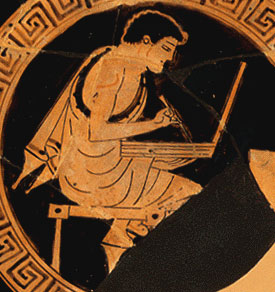
A Greek student writes an essay on a wax tablet (not a laptop!)
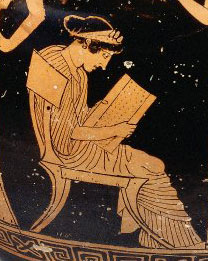
A woman reads a scroll
Still, people who could spare the money did try to send their boys to school. Without learning to read and write and generally becoming educated, boys could not hope to participate in politics when they grew up.
Athenian democracy
Corinthian government
Ancient Thebes
How old were Greek kids when they started school?
Boys started school when they were about 7 years old. Before that, people didn’t want to waste school on kids who were so likely to die of dysentery or malaria. Boys usually went to school until they were about 13.
What is dysentery?
Where did malaria come from?
Life expectancy in ancient Greece
What were schools like in ancient Greece?
Greek schools were small. They had only one teacher and about ten or twenty boys. They met in a small rented storefront, or sometimes just under a tree outside. There were wooden benches, and a chair for the teacher, but no desks. In those days people thought only dignified grown-ups should have backs to their chairs. Kids and poor people sat on wooden stools.

A South Italian teacher beating a boy at school. From the Villa of Julia Felix, now in the Naples Archaeological Museum
Did Greek teachers hit the kids?
At school, teacher often hit the boys with sticks if they didn’t learn fast enough. Many boys were terrified of going to school, because the teachers hit them so hard and so often.
In those days, teachers thought hitting kids made them work harder and learn faster. But really it just made the kids angry and frightened. (Today it’s against the law in most places for teachers or principals to hit kids.)
What’s a paidogogus?
An enslaved man – a paidogogus, or boy-leader – walked with some richer boys to school, waited while they were at school, and walked home with them after school. The paidogogus’s job was to make sure the boys were safe from assaults and harassment, and that they behaved themselves at school and on the way there and back.
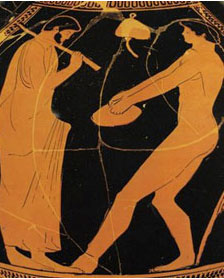
An athletic coach holding a cane to hit the boys if they don’t throw the discus far enough.
Was there a summer vacation?
There was no long summer vacation in those days, and there were no weekends.
But there was no school on religious festival days, and probably that added up to about as many days as you have off. Their days off probably came three or four at a time, more often than your long holidays, but less often than weekends.
What did boys learn in Greek schools?
In school, boys learned to read and write. Boys learned to read from papyrus scrolls, or from cheaper texts written on pieces of wood or on broken pieces of pottery. Schoolboys had to memorize large amounts of Homer‘s Iliad and Odyssey.
Who was Homer?
Summary of the Iliad
And the Odyssey
Probably they memorized these verses from slabs of wood that had just a few lines written on them, so they could learn those lines and then pass their tablet to another boy when they were done with it.
What were tests like in Greek schools?
When you had finished learning your lines for the day, you went up to where the teacher was sitting and recited them to him. If you got them right, he would praise you and give you another tablet with more lines to learn. If you got them wrong, he would beat you with his stick. Most boys were very nervous about reciting!
What did Greek kids use to write on?
When you were learning to write, you didn’t use papyrus and ink – they were much too expensive for kids. The teacher wrote out the Greek alphabet, and then sentences, on pieces of pottery, or on wood, or by scratching their letters into a thin wax coating on a piece of wood. You copied them over and over underneath his writing until you could do it well.
How to make your own wax tablet
Where did wax come from?
History of the alphabet
What is an abecedarium?

A Greek abecedarium on a wax tablet from Marseilles, in southern France. The Greek alphabet is written backwards, from right to left.
Greek people called the scrap that had the alphabet written out for you an abecedarium, which is one of my favorite words!
More about the Greek alphabet
Did Greek schools have music class?
Boys also learned to play the lyre (the kithara) and the pipes (the aulos), and to sing. Often their fathers called them in to their dinner parties to play and sing for the guests.
More about Greek music
How about science class? Or gym class?
They learned some astronomy, and some geometry, too. Maybe they learned to use an abacus. And from a different teacher, after school, they had athletic coaching. Their coach carried a stick to beat them with, too!
Learn by doing: making a Greek lyre
More about ancient schools
Bibliography and further reading about Greek schools:
Eyewitness: Ancient Greece , by Anne Pearson. Easy reading.
Ancient Greek Children (People in the Past Series-Greece), by Richard Tames (2002). Easy reading.
Children and Childhood in Classical Athens, by Mark Golden (1993).
Ancient Literacy, by William V. Harris (1991). Groundbreaking. Argues that there was much less literacy in the ancient world than people have assumed.
A History of Education in Antiquity, by Henri Marrou (1948). Nothing better has come along yet, so this is the old stand-by.
The Gymnasium of Virtue: Education & Culture in Ancient Sparta, by Nigel M. Kennell (1995).



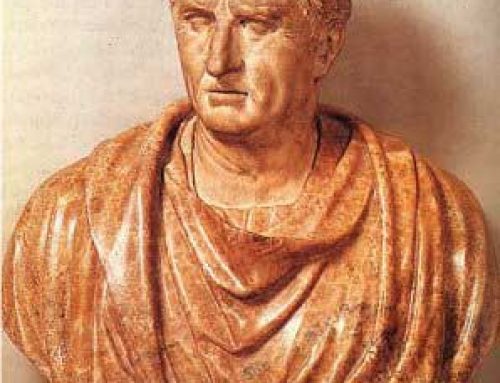

I don’t know if this is the right plank, but I’m trying to figure out more information about Stoic education.
At what age did Stoic study start and did it entail music and physical education or just philosophy.
Thanks for reading.
Hi Steve! There are a lot of different possible tracks for ancient education, because it wasn’t centralized by the state (and even today there are a lot of different options). Some children were tutored at home – homeschooled – and then they might have had a Stoic tutor, but he would also have made sure they got music and exercise. Others would have gone to a regular elementary school, which would have taught reading, writing, arithmetic, music, and physical education, and then as young adults they might have switched to a more advanced school run by Stoics. I don’t think there were specialized Stoic elementary schools like a Montessori or Waldorf school today. Does that help?
thank you so much, I got all the information I needed and was very satisfied, maybe next time you can specify a bit more what they learned but great job.
Hi Lola,
I’m glad we could help!You can find out more about what they learned here: https://quatr.us/greeks/ancient-greek-science.htm
This really helped with my school project! Thanks!
Happy to help! If you want to return the favor, please consider putting a link to Quatr.us on your school or teacher page. More people will see this site then and be able to use it!
oooooooooooooooooooooooooooooooooooooooooooooooof bud
This article actually helped me
I’m happy to hear it!
thank you
This was a good reliable website. Thank you
You’re welcome, Corey! Thanks for stopping by.
that was a good article
This was very helpful
This website is stupid, and unreliable! Shame on you people who use this site for important tasks! You need t find a better source of information.
Hi Alex! What exactly are you disagreeing with here? We’d be happy to fix any errors.
hey
this website is great
oof
My son got all the information he needed to do his homework on Ancient Greece schools, was very helpful to him. Thank you so much.
Satisfied Mom
& Son
Very happy to hear it!
is this true another site says boys start at the age of 6 not 7
There’s probably some variation in different places and times – ancient Greece was a lot of different city-states over hundreds of years, so I’m sure there were some changes in when boys started school.
THIS DIDNT HELP AT ALL
Sorry to hear it! What were you trying to find out?